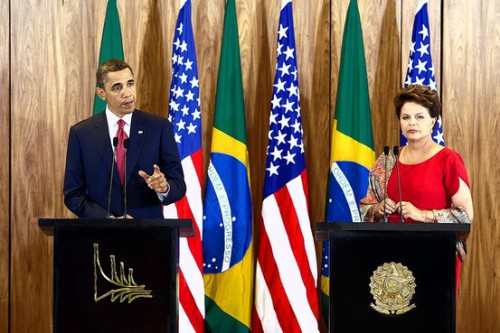La maggior parte dei sondaggi indicavano Dilma Rousseff i vantaggio alla vigilia del ballottaggio presidenziale in Brasile. Il presidente uscente del Brasile, Luiz Inacio “Lula” da Silva, leader iper-popolare il cui rating nella fase finale del mandato, ha superato l’80%, ha rafforzato la posizione della Rousseff alla presidenza, ribadendo che il voto per Dilma è nei fatti, uno votare per lui. Le espressioni di sostegno del presidente da Silva, ovviamente, hanno contribuito a influenzare l’elettorato brasiliano, e il 31 ottobre Dilma Rousseff è stata votata come primo presidente donna del Brasile, con un voto del 56%, 11% in più rispetto al suo rivale José Serra.
Tra le altre cose, Lula deve essere accreditato della soluzione del problema della continuità politica: il suo ex braccio destro, donna, Dilma Rousseff è sicura di prendere in consegna la lista delle priorità strategiche del suo predecessore, che comporta armonizzazione sociale, sviluppo economico sostenibile, sovranità nazionale e fare del Brasile un centro di potere nel mondo d’oggi. Senza dubbio, Rousseff ha le credenziali necessarie per guidare il paese emergente come peso massimo globale. Economista di formazione, è stata presidente di Petrobras, gigante energetico statale brasiliano e ha già ricoperto incarichi nell’amministrazione da Silva. Tra i successi della Rousseff vi è la realizzazione di un programma di costruzione di alloggi a prezzi accessibili, cosa che ha premiato la sua posizione politica. Inoltre, la nuova presidentessa del Brasile gode della reputazione di una persona generalmente aperta al dialogo, ma assolutamente intransigente quando si tratta di questioni di principio.
Il presidente da Silva ha spazzato via il mito dei media che un “posto ombra” lo attendeva nell’amministrazione Rousseff, e che avrebbe mantenuto un ruolo decisionale sotto la nuova presidenza. Ha sottolineato l’indipendenza politica do Dilma e ha detto che avrebbe formato il governo da politica autonoma.
Nel suo primo discorso da presidentessa, Rousseff ha dichiarato che la sua priorità sarò quella di elevare il tenore di vita brasiliano, raggiungendo il livello comune tra i paesi industrializzati. Ha chiamato la comunità brasiliana del business a sostenere le prossime iniziative del governo, in particolare quelle volte a eliminare la povertà e la fame dal paese, e ha invocato la parità di genere, la libertà di parola, i diritti umani e la libertà di religione come elementi essenziali del suo programma. Rousseff, inoltre, ha sottolineato che non ci dovrebbero essere bambini abbandonati in Brasile.
Rousseff promette di perseguire politiche economiche e finanziarie indipendenti, allargando i mercati per la produzione industriale e agraria del Brasile, prevenire il ripetersi dell’inflazione e combattere la speculazione. Nella sua agenda nei i prossimi quattro anni, figurano in una posizione forte la sicurezza nazionale, la lotta contro il narcotraffico, la corruzione e altri tipi di reato. Ammettendo che il ruolo di successore di Lula – “il genio Lula“, come dice Rousseff – ha imposto un ulteriore misura di responsabilità, la neoeletta presidentessa del Brasile s’è impegnata a fare del suo meglio per vincere la sfida.
Il leader venezuelano Hugo Chavez è stato il primo a congratularsi con la Rousseff. Aveva detto nel suo discorso settimanale televisivo, nel periodo che precedeva il voto in Brasile, che la vittoria di Rousseff era imminente e aveva anche generosamente previsto che avrebbe raccolto il 60% dei voti. Chavez non sta tentando di nascondere la sua contentezza: il risultato delle elezioni in Brasile ha segnato la fine della rimonta della destra in America Latina. I soldi di Washington, il sostegno dei media e, occasionalmente, le operazioni sotto copertura per sostenere i candidati pro-USA nelle presidenze in Messico, Honduras, Panama, Cile e Costa Rica, spingendo i commentatori a far circolare previsioni secondo cui la marcia populista in America Latina era finita, o anche che la scomparsa dei regimi sfidanti in Venezuela, Bolivia, Nicaragua, Ecuador si profilava all’orizzonte. L’avvento della Rousseff, almeno ripristina lo status quo, garantendo che i regimi orientati verso il socialismo del XXI secolo continueranno a beneficiare del sostegno del Brasile.
In diplomazia, ci si può aspettare che la Rousseff si attenga alla strategia pragmatica di da Silva, nel selezionare i partner sulla base degli interessi del Brasile, a prescindere da come Washington definisca quei paesi. Ci sono informazioni che la squadra dei consulenti che da Silva ha usato per aiutarsi a tracciare il futuro corso della politica estera del Brasile, sono rimasti per la maggior parte, e che la nuova amministrazione si concentrerà sul rafforzamento del BRIC, il gruppo dei paesi dalle economie in continua espansione che comprende Brasile, Russia India e la Cina. Il Brasile inviterà le imprese russe ad assumere un ruolo più importante nel suo settore energetico, soprattutto per esplorare e sviluppare congiuntamente con Petrobras, i campi scoperti di recente sul fondale oceanico del Paese. Impressionanti opportunità esistono anche nel settore della costruzione di oleodotti. Il presidente da Silva ha fatto seri sforzi per espandere il commercio di armi tra il Brasile e la Russia e, considerando che il Brasile sta attivamente modernizzando le sue forze armate, i piani per il futuro non sono così lontano dall’essere ancora più ambiziosi. L’esperienza del Brasile nella cooperazione tecnico-militare con la Russia è positivo. Nel marzo scorso il paese ha ricevuto i primi 3 dei 12 elicotteri Mi-35 russi, del valore di 150m di dollari. L’accordo prevede, inoltre, la corrispondente formazione dei piloti brasiliani, la manutenzione e il trasferimento tecnologico. L’azienda aerospaziale brasiliana Embraer, una società annoverata tra i leader mondiali nel settore, prevede di fare investimenti congiuntamente con la Russia, nel settore delle tecnologie aerospaziali di prossima generazione. L’industria e la ricerca aerospaziale sono i settori in cui la cooperazione tra il Brasile e la Russia sarà probabilmente più feconda.
I piani per il partenariato strategico Russia-Brasile si completerà nei decenni futuri, il che significa che molto deve essere fatto nel “era Rousseff“.
Copyright 2010 © Strategic Culture Foundation
E’ gradita la ripubblicazione dell’articolo a condizione del collegamento ipertestuale diretto al giornale on-line “Strategic Culture Foundation” (www.strategic-culture.org).
Traduzione di Alessandro Lattanzio
http://www.aurora03.da.ru
http://www.bollettinoaurora.da.ru
http://sitoaurora.xoom.it/wordpress/





 del.icio.us
del.icio.us
 Digg
Digg